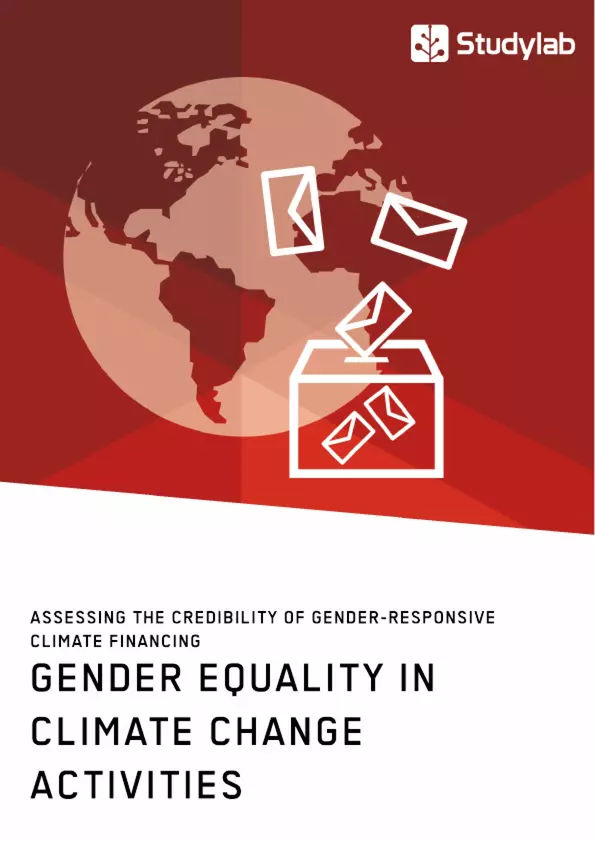Climate change affects everyone, independent of race, nationality or gender status. Nevertheless, there are countries and people that are more affected: In many ways, women exceptionally suffer from climate change’s effects. But how are climate change and women’s rights connected with each other?
To what extent do G7 nations provide developing countries with funds for climate change activities? How do they promote gender equality? Do the G7 nations correctly report their aid activities?
This book shows the unsatisfying quality of the nations’ self-reporting and explains the possible reasons for as well as the consequences of the deviations. It detects to what extent gender equality is promoted in climate change projects and recommends improvements concerning women’s rights.
Keywords:
- Feminism;
- Global Warming;
- Emissions;
- Adaptation;
- Sustainable Development Goals;
- Inequality
Inhaltsverzeichnis (Table of Contents)
- 1 Introduction
- 2 Introducing Climate Change and Gender
- 2.1 Climate Change in a Nutshell
- 2.2 Adaptation: What, Why and Who?
- 2.3 Adaptation Costs and Responsibilities: Questions of Justice
- 3 Gender Dimensions of Climate Change: Understanding the Linkages
- 3.1 Starting Point: Feminist Political Ecology
- 3.2 Gender, Inequality and Gender Mainstreaming
- 3.3 The Gendered Impacts of Climate Change
- 3.4 Gender Equality and Climate Change: Growing Recognition
- 3.5 Criticism: "Vulnerable Women of the Global South"
- 4 The Credibility of Gender-Responsive Adaptation Finance
- 4.1 Data and Methodology
- 4.2 Literature Review: Assessing the Rio Marker Data Credibility
- 5 Analysis
- 5.1 Descriptive Analysis
- 5.2 Qualitative Analysis
- 6 Conclusion
Zielsetzung und Themenschwerpunkte (Objectives and Key Themes)
This publication explores the credibility of gender-responsive climate financing, aiming to provide a comprehensive assessment of the extent to which existing financing mechanisms effectively integrate gender considerations and contribute to achieving gender equality in climate change activities. The study analyzes data on adaptation finance provided by the Development Assistance Committee (DAC) of the Organisation for Economic Co-operation and Development (OECD), focusing on the period between 2013 and 2016.
- The linkages between climate change and gender equality
- The role of gender-responsive adaptation finance in achieving gender equality
- The credibility and effectiveness of existing adaptation finance mechanisms
- The challenges and opportunities for improving gender integration in climate financing
- The need for more transparent and accountable adaptation finance practices
Zusammenfassung der Kapitel (Chapter Summaries)
The first chapter introduces the context and significance of the study, highlighting the increasing need to address gender equality in climate change responses. Chapter two provides a basic understanding of climate change and its impacts, particularly focusing on the concept of adaptation and its associated costs and responsibilities. The third chapter delves into the gender dimensions of climate change, exploring the link between climate change and gender inequality, the impact of climate change on women and men differently, and the growing recognition of gender equality in climate change efforts. Chapter four introduces the study's methodology and analyzes data on adaptation finance provided by the OECD DAC, examining the credibility of the Rio Marker data, which aims to measure gender-responsiveness in climate finance. Chapter five presents the results of the analysis, providing both descriptive and qualitative insights into the extent to which adaptation finance is gender-responsive.
Schlüsselwörter (Keywords)
The key concepts and focus topics of this publication include gender equality, climate change, adaptation finance, gender-responsive climate financing, Rio Marker, OECD DAC, data analysis, credibility assessment, gender mainstreaming, feminist political ecology, climate justice, and sustainable development.
- Arbeit zitieren
- Anonym (Autor:in), 2019, Gender Equality in Climate Change Activities. Assessing the Credibility of Gender-Responsive Climate Financing, München, GRIN Verlag, https://www.grin.com/document/495267



